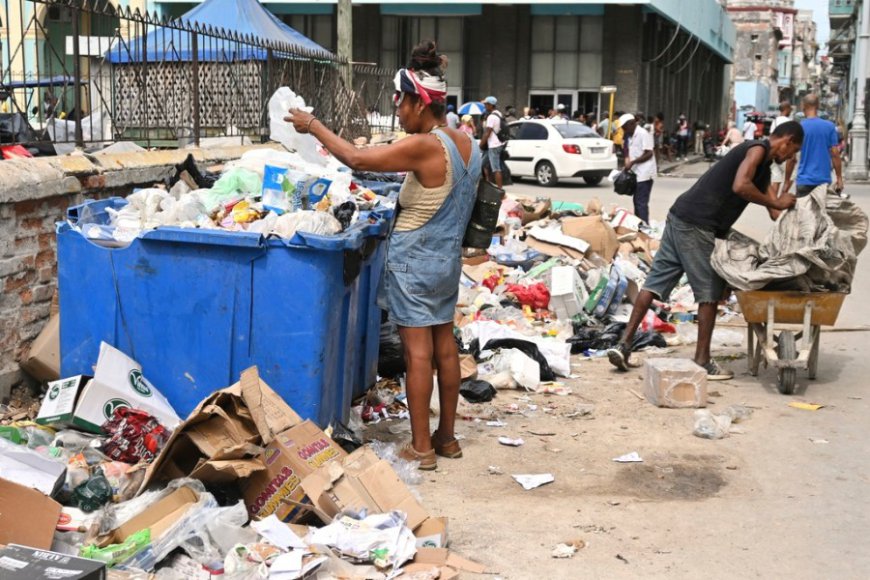Cuba is in crisis — the US has a chance to act
Over six decades of revolution have taken their toll. It is time for the international community to raise awareness of Cuba’s desperate reality — and to demand change from its leadership.

This spring, thousands of Cubans gathered in Havana’s Revolutionary Square to mark the nation’s Labor Day celebrations. Only this year, there was nothing to celebrate. Cuba is experiencing a national catastrophe, and the Cuban people are growing increasingly desperate.
In the midst of likely the most severe economic crisis to affect the island, on May 1, the Cuban government pressured its citizens to attend the annual gathering. It’s been reported that some 600,000 were present in Havana, with millions attending similar ceremonies across Cuba. But participation in such rallies is hardly voluntary — it is the price one pays for access to state benefits, including employment, housing, education, food rations and other necessities.
Despite drastic shortages of water, food, medicine and fuel that have crippled Cuba in recent years, on this day, all assets of the government were used to facilitate attendance at the Revolutionary Square event. And that’s because this gathering, like others, was intended to serve as an act of political will, meant to convey a public message of support for the ailing Cuban government.
Although Cuba’s leadership changed in name in 2019 to Miguel Diaz-Canel, Raúl Castro is still believed to be in charge behind the scenes. Despite turning 94 last month, he appears to remain the center of power, wielding significant influence over political, economic and military matters.
Under his guidance, social control measures remain all-encompassing, beginning at the community level with the neighborhood Committees in Defense of the Revolution, the Brigades of Rapid Response, the National Revolutionary Police, the Revolutionary Armed Forces, and the Grupo de Administración Empresarial S.A., which facilitates the Cuban military’s control over the economy. All of these government structures, reminiscent in some cases of George Orwell's writings, have ensured the continuation of Cuba’s one-party system for the last 66 years.
Today, the greatest concerns of the Cuban government are the incessant electricity outages. Once largely restricted to Cuba’s outlying provinces, the blackouts are now also frequent in the capital. They are the direct result of government incompetence that has led to fuel shortages and aging infrastructure; without a doubt, they make daily life extremely challenging.
In March 2025, following a major failure at a substation, much of the country was without power, leading to vast work and school closures. This was the fourth such national outage in six months. For a country already suffering from abysmally low monthly incomes, no functioning economy, and decaying living standards, it’s no surprise that the population has grown increasingly discouraged.
Although the Cuban government continues to blame the nation’s challenges on the U.S. economic embargo, the aftereffects of the COVID-19 pandemic, and changes to U.S. travel policy, each day it appears fewer and fewer Cubans accept these excuses. In the last several years, an estimated 1 million Cubans have emigrated, representing a loss of roughly 10 percent of Cuba’s population.
And protests, once extremely rare, have become a relatively more common occurrence.
In early June, students at the University of Havana began protesting a sharp hike in internet and cell phone service fees set by the government-run telecommunications company. This entity, largely owned by Cuba’s military, is said to be well financed by Cuban exiles who purchase cellphone packages for their families on the island and represents an important revenue source for the Cuban government.
For Cuba’s leadership, these price hikes are also likely intended to curtail internet usage — an important strategy for a government that aims to control all access to information.
Another government concern is the lack of access to foreign and hard currency reserves to facilitate trade, specifically for the import of much needed food and medicine. Once the recipient of financial support from the former Soviet Union during the Cold War, followed by Venezuela under President Hugo Chávez, today Cuba is without an economic benefactor.
Although Cuba still benefits from political support from Russia, China, Iran, North Korea and others, these allies cannot (or will not) effectively assist Cuba economically. Add to that Cuba’s foreign debt, which is said to be extremely high, leaving the country severely constrained when it comes to trade.
Against this background, the new Trump administration has made changes to U.S.-Cuba policy. As part of his sweeping cuts to USAID, President Trump cancelled Radio and TV Martí, two longtime stalwarts in the U.S. soft assault against Cuban communism.
Since taking office, the Trump administration has also moved to redesignate Cuba as a state sponsor of terrorism, and approved the re-creation of the Cuba Restricted List, which prohibits transactions with companies associated with the Cuban government. In late January, the administration also announced that it had opened the door via Title III of the LIBERTAD Act, to “bring private rights of action involving trafficked property confiscated by the Cuban regime.”
More recently, following record-setting outward migration from Cuba, the Trump administration moved to end the “humanitarian parole” program that had allowed a designated number of Cubans to enter the U.S. under temporary legal status. On June 4, the U.S. announced a partial travel ban on Cubans wishing to enter without an existing visa. And Trump’s “big beautiful bill” includes a tax on remittances, affecting Cuba’s largest source of foreign revenue.
Today, Cuba is facing a devastating moment. Over six decades of revolution have taken their toll. Cuba’s leadership remains unwilling to enact the commonsense democratic reforms necessary to alleviate suffering and return dignity to its people. As Cuban citizens continue to find small, but meaningful ways to express their discontent, it is time for the international community to raise awareness of Cuba’s desperate reality — and to demand change from its leadership.
Cristina Lopez-Gottardi, Ph.D., is an assistant professor and chair of programming at the University of Virginia’s Miller Center.
What's Your Reaction?
























